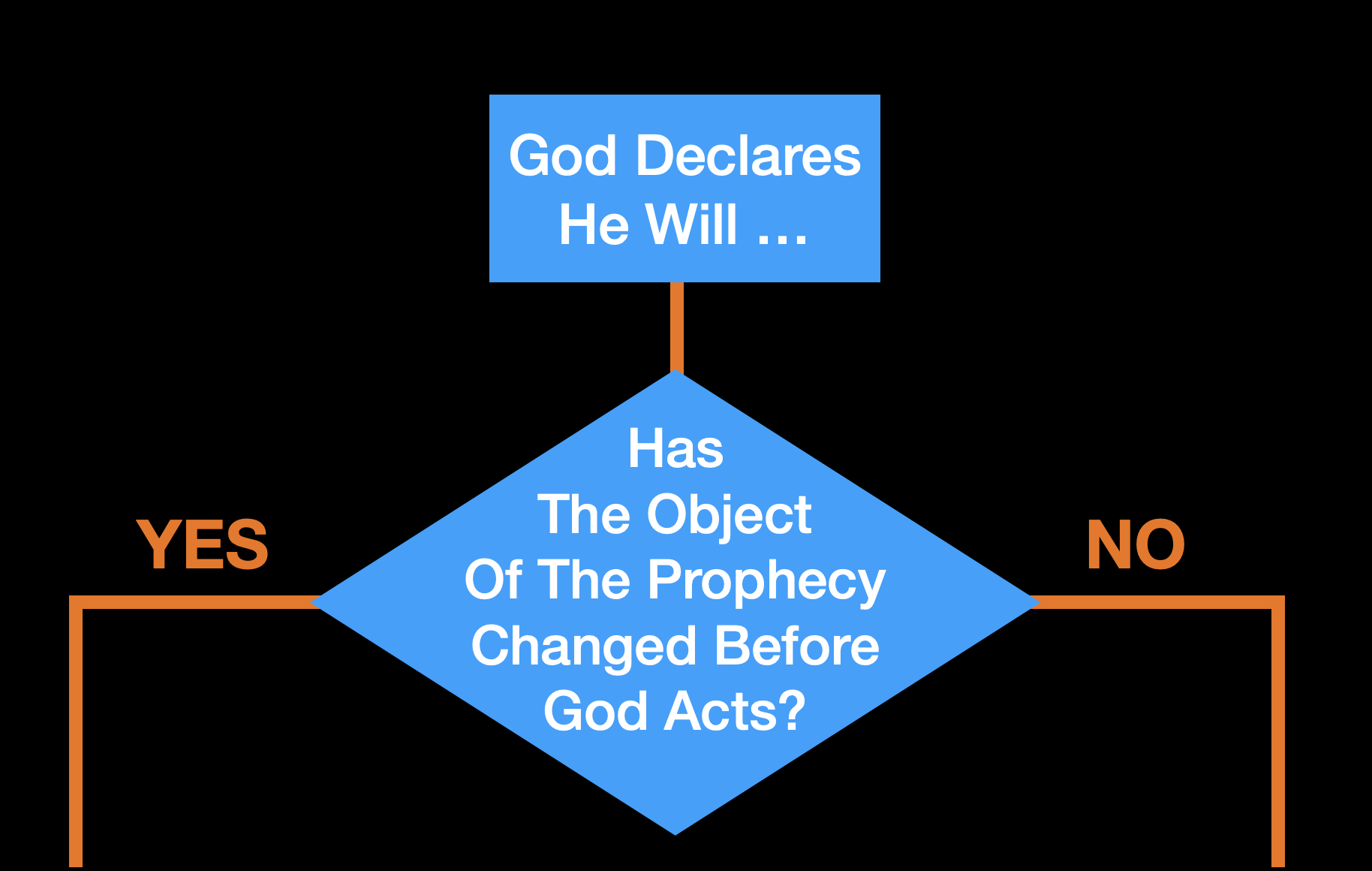As Jonah walked through Nineveh, had his experience with the fish changed his skin’s appearance? We don’t know. What we do know is he announced, "Forty days and Nineveh will be overthrown" (Jonah 3:4). Yet, after 40 days God had not overthrown the Assyrian capital. Why not?
Prophecies of National Woe
Jonah’s encounter with Nineveh illustrates a principle God would reveal to Jeremiah. "There are times when I threaten to uproot, tear down, and destroy a nation or kingdom. But if that nation I threatened stops doing wrong, I will cancel the destruction I intended to do to it" (Jeremiah 18:7-8).
God foretold Nineveh’s demise. Yet when the king of Nineveh along with its citizens fasted, cried out to God and repented of their violence, God relented from destroying them (Jonah 3:7-10). What had been prophesied did not occur.
A particular detail should impress itself upon our minds. Although Jonah simply declared God would destroy Nineveh, this prophecy was conditional – even though the prophecy did not contain any indication of being contingent.
A second detail is notable. Because Jonah understood God to be "the one who relents concerning threatened judgment," Jonah anticipated God would act graciously toward Nineveh if they repented (Jonah 4:2). Jonah knew that proclaiming God’s judgment would not guarantee Nineveh’s destruction. They might repent! Hence, his solution was to remove the possibility of repentance by running away and never announcing Nineveh’s destruction.
The 8th century B.C. provides us with another example of prophecy’s conditional nature. Although the LORD had announced through Micah that Jerusalem would be destroyed (Micah 3:12), when Hezekiah showed reverence for God and sought the Lord’s favor, the LORD chose to relent from turning the city into a pile of rubble (Jeremiah 26:18-19). Once again, although Micah’s message did not indicate conditionality, condemnation was contingent upon a human response.
Prophecies of Individual Woe
Ezekiel learned that the conditional nature of prophecy also applies to individuals. "Suppose I say to the wicked, ‘You must certainly die,’ but he turns from his sin and does what is just and right. … He will certainly live—he will not die" (Ezekiel 33:14,15).
King Hezekiah provides a second example of God reversing a prophecy. God told Hezekiah, "Give your household instructions, for you are about to die; you will not get well" (2 Kings 20:1). However, God responded to Hezekiah’s prayer and tears by healing him and extending his life fifteen years. Once again the prophet’s message provided no hint that the prophecy was conditional. It just was.
Thus God’s judgments on nations and individuals are contingent upon how people respond. When people turn to God, God can relent from bringing the woe he had foretold.
Prophecies of National and Individual Blessing
If God’s prophecies announcing woe are conditional, what about the other side of the prophetic coin? Is God forced to bless if he has foretold it? Are these prophetic messages also conditional?
As we might anticipate, "If at any time I declare concerning a nation or a kingdom that I will build and plant it, and if it does evil in my sight, not listening to my voice, then I will relent of the good that I had intended to do to it" (Jeremiah 18:9).
The words, "if at any time" should clue us into realizing that a prophecy need not announce its contingency in order for it to be conditional. Although at times the conditional nature of what God will do might be expressed, as in Leviticus 26:3, nevertheless foretelling remains conditional even without explicit statements.
What is true regarding God’s national pronouncements is also true for individuals. "Suppose I tell the righteous that he will certainly live, but he becomes confident in his righteousness and commits iniquity. None of his righteous deeds will be remembered; because of the iniquity he has committed he will die" (Ez 33:13).
Isaiah’s Prophecies Regarding Post-Exilic Israel
Since the latter part of Isaiah addresses exilic and post-exilic Israel, it is fitting that this context concludes with a message of hope. Characteristic of this new beginning would be worship within a rebuilt Jerusalem where people live for more than a hundred years and enjoy the fruit of their labor. Something not experienced in captivity. In describing the coming blessings, Isaiah announced new heavens and a new earth.
As we have previously observed, the prophets used cosmological language to poetically, graphically and powerfully portray God destroying as well as blessing. At times the cosmic imagery of the heavens going dark and the earth being ruined vividly captured God devastating a nation. Conversely, it would be appropriate for Isaiah to describe God blessing Israel with a fresh start by announcing new heavens and a new earth.
If we allow Isaiah to present God’s message through him, it does appear God announced a wonderful new era of blessings upon post-exilic Israel. Yet, Israel never experienced such a dramatic new beginning and renewal. Why? We may not need to look any further than Israel’s post-exilic failure to live up to God’s expectations.
Was it necessary for Israel to be glorified? The Son of God’s incarnation was not dependent upon an exalted Israel. God’s plan to make redemption possible for all humanity and to unite Jew and Gentile through the blood of Christ was not dependent upon Israel’s faithfulness nor her national wellbeing.
As for Peter’s appropriation of Isaiah’s language about new heavens and a new earth, clearly Peter’s Spirit-directed message depicts the end of the world. Using a typological approach, Peter announced a wonderful new beginning for God’s people.
Part one of this four part series is: Isaiah’s New Heavens and New Earth (Interpretation Principles)
- Tolerance, Acceptance and Inclusion - 2026-01-14
- Believe: Sometimes A Synecdoche - 2026-01-07
- Christian Virtues Impact - 2025-12-17
